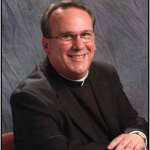Paul A. Holmes is Distinguished University Professor of Servant Leadership at Seton Hall University. He wrote the “Introduction” and “Chapter 1: A Theology of Management: Why We Do What We Do” for A Pastor’s Toolbox. The book is a resource for the “Toolbox for Pastoral Management” initiative of the university and the National Leadership Roundtable on Church Management. It is “a weeklong face-to-face workshop experience to address the critical issues of parish management,” he wrote in the Introduction, “especially for new pastors” (p. 2).
In Chapter 1, Holmes explains the role of the priest-manager by correlating the church’s five administrative expectations of the Catholic pastor with the threefold “munus” or gift of Jesus Christ as priest, prophet, and king. The five expectations are drawn from a 2008 publication of the National Catholic Educational Association entitled In Fulfillment of their Mission: The Duties and Tasks of a Roman Catholic Priest. It states that the priest, as the leader of parish administration, must know how to plan, to implement the plan, to consult, to animate the ministry of parishioners, and to be a financial steward.
Holmes correlates these five duties with the identity of the pastor as priest, prophet, and king. Then he links two virtues with each identity: the priest must he holy and grateful, the prophet must be truthful and faithful, and the king must show forgiveness and good judgment.
Holmes artfully weaves together the five tasks, three roles, and six virtues, and arrives at this conclusion: the priest does what he does (1) because the church expects it, (2) because he shares in the triple identity of Christ, and (3) because he manifests his identification with Christ through the practice of virtues. All of this is complicated, but not difficult to follow.
Holmes is the editor of A Pastor’s Toolbox, and the chapters read as if they were transcripts of workshop talks to an audience of priests. One author speaks of himself as “a fellow pastor,” another addresses the reader as “you and your brother priests,” and a third urges his reader to be “the ‘best priest’ you can.” Surely the readership of A Pastor’s Toolbox is meant to be larger than priests who are workshop participants.

